|
|
|
Sort Order |
|
|
|
Items / Page
|
|
|
|
|
|
|
| Srl | Item |
| 1 |
ID:
091791
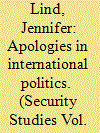

|
|
|
|
|
| Publication |
2009.
|
| Summary/Abstract |
This article examines the growing conventional wisdom that apologies and other acts of contrition are necessary for international reconciliation. I create and test a theory that connects a country's remembrance with that country's image-threatening or benign-in the eyes of former adversaries. I evaluate the theory in two post-World War II case studies: South Korean relations with Japan and French relations with Germany.
This article offers three major findings. First, it substantiates the claim that denials inhibit reconciliation. Japanese denials and history textbook omissions have elevated distrust and fear among Koreans (as well as Chinese and Australians). Second, although whitewashing and denials are indeed pernicious, the conventional wisdom about the healing power of contrition must be seriously reconsidered. Evidence from the Japanese and other cases suggests that contrition risks triggering a domestic backlash, which alarms former adversaries. Finally, there is good news for the prospects of international reconciliation: countries have reconciled quite successfully without any contrition at all. West Germany actually offered very little contrition at the time of its dramatic reconciliation with France; many other countries have restored close and productive relations without contrition. The best course for reconciliation is to remember the past in ways that are unifying, rather than divisive, and minimize the risk of backlash.
|
|
|
|
|
|
|
|
|
|
|
|
|
|
|
|
| 2 |
ID:
086559
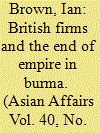

|
|
|
|
|
| Publication |
2009.
|
| Summary/Abstract |
A detailed examination of the war-time discussions within the British government and between government and the private sector over the direction of Burma's post-war economic reconstruction and the conditions under which companies might return. Through the focus on capital and commerce, the author seeks to explore British understandings-and misunderstandings- in their broadest sense.
|
|
|
|
|
|
|
|
|
|
|
|
|
|
|
|
| 3 |
ID:
158066


|
|
|
|
|
| Summary/Abstract |
In this study, we analyse a visit by two Japanese cruisers (the Izumo and Yakumo), commanded by Admiral Yamamoto, to Turkey in 1926. Although the visit's aim was overstated at the time, its contribution to Turkish–Japanese relations cannot be disregarded. Ambassador Obata and Admiral Yamamoto's emphasis on and discourse in relation to Turkish–Japanese friendship demonstrate that the Japanese imposed different meanings on the trip, the most important part of which was to Istanbul, where visits to official departments, programmes for naval students and familiarizing Istanbulites with Japan were important activities. The Istanbul press published news about the Japanese guests and their daily activities. After Istanbul, the delegation went to Ankara for official visits. However, these visits were little reported in Turkish news columns or the press of the period. In fact, the visit is reflected in just one or two sentences in the pages of history.
|
|
|
|
|
|
|
|
|
|
|
|
|
|
|
|
| 4 |
ID:
126027
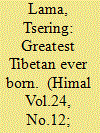

|
|
|
|
|
| Publication |
2011.
|
| Summary/Abstract |
Thupten arrived at the Kathmandu airport, grabbed his duffle bag from the conveyor belt and walked right past the security check. There was a huddle of people waiting to put their bags into the scanner, and at the sight of him they gripped their rusty carts and shouted at the security guards, 'Oye! Ke ho esto? Wake up, security!' But the skinny men didn't stand a chance at stopping Thupten. Instead, they just sat on their wooden stools, mouths agape as the strange longhaired man barrelled by with his duffel bag. Was he Chinese? Japanese? He didn't even look back! He just stomped by, right towards the sunny glass doors where a hundred greeters waited for loved ones, though Thupten knew none of them waited for him.
|
|
|
|
|
|
|
|
|
|
|
|
|
|
|
|
| 5 |
ID:
189324
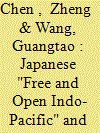

|
|
|
|
|
| Summary/Abstract |
This article examines the Chinese assessment of and responses toward the Japanese "Free and Open Indo-Pacific" (FOIP) concept against the background of evolving Sino-Japanese relations. Addressing both its security and economic concerns, the FOIP is Tokyo's top-level regional strategy design in the context of China's rise. The development of the Japanese FOIP has been fluctuating with the evolution of Sino-Japanese relations and the emerging Sino-U.S. strategic contest over the past decade. The complexity and the fluid nature of the Japanese FOIP has prompted varying assessments and policy recommendations among Chinese analysts, which can be roughly divided into three categories: the hardline approach, the hedging approach, and the docking approach. Meanwhile, remarks of Chinese officials on the Japanese FOIP remain elusive, carefully differentiating between the Indo-Pacific strategy of the United States and that of Japan. All of these aspects reveal the complexity and flexibility of China's policies. The COVID-19 pandemic and the recent domestic changes of Japan and the U.S. have further complicated geopolitical and geoeconomic tensions. As a consequence, the Sino-Japanese relationship has become awkward once again.
|
|
|
|
|
|
|
|
|
|
|
|
|
|
|
|
| 6 |
ID:
156975
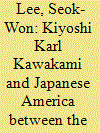

|
|
|
|
|
| Summary/Abstract |
Kiyoshi Karl Kawakami was one of the most influential Japanese immigrant journalists to defend Japanese imperialism. He did so at a time when Japanese immigrant communities showed various responses to Japan’s becoming an Asian empire between the two world wars. This article shows how a Japanese immigrant journalist utilized minority politics to represent Japanese immigrant communities in the United States. Cooperating with the Japanese government’s public diplomacy and propaganda projects, Kawakami also linked the interests of his home country and Japanese immigrant communities to American national interests. For this purpose, he utilized the notions of open-door international trade and anti-communism – both widely shared by the American public – to justify Japanese imperialism and hide its colonial nature.
|
|
|
|
|
|
|
|
|
|
|
|
|
|
|
|
| 7 |
ID:
085879


|
|
|
|
|
| Publication |
2009.
|
| Summary/Abstract |
On 23 July 2007 a video short attached to an online article in the New York Times proclaimed " Japan is asserting itself militarily.It is embracing right-wing nationalism.
|
|
|
|
|
|
|
|
|
|
|
|
|
|
|
|
| 8 |
ID:
149259


|
|
|
|
|
| Summary/Abstract |
Youth who grow up in Japanese child welfare institutions (‘children’s homes’ or ‘orphanages’) are socially and structurally marginalized, and many have pasts characterized by neglect and abandonment. In a contemporary context in which young people in Japan are encouraged to think of themselves as agentive, ‘self-responsible’ subjects, I argue that Japan’s child welfare system disproportionately depends on chance in shaping positive or negative outcomes for state wards. Japan’s system of care and emancipation from the child welfare system is, I suggest, rooted in a non-empiricist view of experience: despite the fact that most of us depend on our past experiences to guide our expectations for the future, the child welfare system demands that youth leaving care break with a past of dependency and social marginalization to care for themselves with minimal or no state assistance. This article focuses on Tanpopo, a self-help group for people with putatively common experiences receiving care in a child welfare institution. I explore two Tanpopo members’ narratives in order to interrogate the assumptions about ‘experience’ that underlie Japan’s child welfare system itself, and the discursive representations of self-responsibility and agentive action in Japan today.
|
|
|
|
|
|
|
|
|
|
|
|
|
|
|
|
| 9 |
ID:
171950
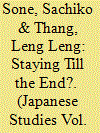

|
|
|
|
|
| Summary/Abstract |
International Retirement Migration (IRM) began in Europe and North America in the 1960s and the concept first entered Japan in the 1980s. Since the 1990s, it has become increasingly referred to as long stays/lifestyle migration. As sojourners seeking a better life overseas, Japanese later-life migrants tend to be perceived as temporary stayers and there has been little question about their sense of belonging. This study, based on a decade of observation and follow up interviews with a small sample of Japanese retiree migrants in Western Australia, examines how migrants’ decisions to stay or leave the host country are affected by the presence of their children, juxtaposed with their sense of belonging, particularly to their homeland. We identify four types of later-life migrants based on their eventual decision to leave or to stay: ‘the returnee’, the ‘on-going migrant’, ‘the potential settler’ and ‘the new citizen’. We argue that for later-life migrants who are constantly debating whether or not to remain in the host country until the end of their lives, the process of decision making is dynamic and often negotiated through a sustained sense of belonging to their homeland.
|
|
|
|
|
|
|
|
|
|
|
|
|
|
|
|
| 10 |
ID:
115884


|
|
|
|
|
| Publication |
2012.
|
| Summary/Abstract |
The article is an attempt to study the history of the Tedim Road, a 265 km transborder road connecting Imphal (the capital of Manipur in India) with Tedim in the Chin Hills (Chin State) in western Burma (Myanmar). It was constructed by the British solely for the purpose of facilitating military movements along the India-Burma frontier during the Second World War. Although it is yet to receive adequate scholarly attention, the historical significance of the Tedim Road as part of the larger Allied plan for the reconquest of Burma after it was lost to the Japanese in the early 1940s cannot be overlooked. The article attempts to analyse encounters between the Allied and the Japanese on this road. It argues that the historical events that occurred on the Tedim Road and the participation of the indigenous tribes of the India-Burma frontier in the war made a significant contribution to ensuring the withdrawal of the Japanese from the Indian frontier.
|
|
|
|
|
|
|
|
|
|
|
|
|
|
|
|
| 11 |
ID:
144693
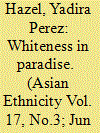

|
|
|
|
|
| Summary/Abstract |
In the 1950s, the Dominican government, under Rafael Trujillo, offered free land to Japanese immigrants to settle along the Dominico-Haitian border. The Japanese colonias, or agricultural colonies, were part of nation-building projects in the Dominican Republic (DR) and Japan, which positioned the Japanese colonias as the solution to both ‘the Haitian problem’ and overpopulation, respectively. However, over time the colonias failed, leaving many Japanese migrants disappointed and in need of navigating national identity between the two states. This article examines the ways in which the Japanese immigrants navigate shifting local and national interest, ideologies, and lived experience to file a legal civil action suit against the Japanese government for an unfound paradisiacal immigrant experience in the DR. The Japanese court-case provides a compelling case to explore how immigrants refashion national discourses of identity and collective legal action to hold natal government’s responsible for settlement while also embracing multiple national and ethno-racial identities in their new homeland.
|
|
|
|
|
|
|
|
|
|
|
|
|
|
|
|
| 12 |
ID:
100298
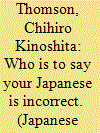

|
|
|
|
|
| Publication |
2010.
|
| Summary/Abstract |
This paper discusses the Japanese language used by JSL learners in Japan, while examining JSL classrooms as public space. It draws upon JSL literature, Japanese textbooks and their discourses to find the kinds of Japanese that are taught and used in JSL classrooms and how they are presented and consumed, and it observes how diversity in learners' language is dealt with inside and outside of JSL classrooms in Japan, keeping in view the danger of 'colonisation' of classrooms. It will then study new developments where JSL speakers are participating in development of their own 'third space', which values hybridity more than diversity, and in turn the continuous re-construction of the public space.
|
|
|
|
|
|
|
|
|
|
|
|
|
|
|
|
|
|
|
|
|